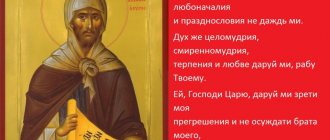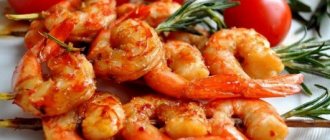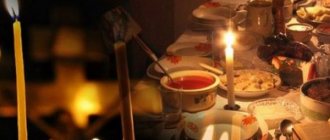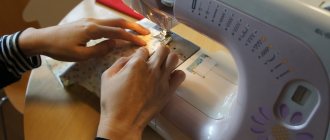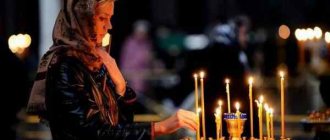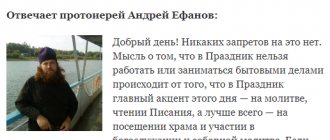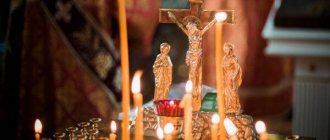In 2022, Lent begins on March 15 and lasts until May 1. Most of us give up meat and dairy foods during Lent, believing that this is the most important thing for observing fasting. In reality, everything is much more complicated. There are a number of conditions that must be fulfilled by those who want to truly go through the path of spiritual purification.
Shutterstock
Despite the fact that food restrictions are an important component of Lent, its true meaning is not fasting. In order to be imbued with the spirit of purification and rethinking of your life, you must not only limit yourself in nutrition, but also take care of your spiritual life. Otherwise, it will not be fasting, but simply a not very successful diet: as practice shows, such “fasting” people often gain from 3 to 5 extra pounds.
So, what should those who take Lent seriously and thoughtfully not do?
Lent - why is it needed?
Even in the first Christian times, people who wanted to be baptized fasted for some time before baptism. At the same time, the sacrament of Baptism in ancient times often. Subsequently, the fast before Holy Easter arose from this fast. If we draw an analogy with being baptized, Lent gives us the opportunity to prepare and worthily meet Christ and the Feast of His Resurrection.
The time of fasting is a very important period for Christians: we can test ourselves, educate ourselves, make ourselves a little better and cleaner. By consciously depriving ourselves of something, we will definitely gain something very important. Therefore, during Lent we voluntarily deprive ourselves of any everyday comforts, thereby making room for spiritual values.
The first forty days of fasting were established in memory of how the Lord Himself, having retired into the desert, prayed before the beginning of His journey to Golgotha. They are followed by Holy Week, the services of which tell in detail about the last days before the Crucifixion of the Savior, His suffering and death.
Participation in the life of the Church during this period allows a person to come into contact with events that occurred two thousand years ago, but are directly related to each of us now. The daily hustle and bustle is distracting; many tasks and worries leave no opportunity to stop and think. And Lent is needed precisely so that we take a break and devote at least a small part of the year not to the external, but to the internal, to look into our hearts, to cleanse our souls. And then the Resurrection of Christ will be for us not just a holiday from the calendar, but the greatest event in the history of mankind, which did not happen “once upon a time,” but concerns each of us personally. Lent allows you not to lose this feeling.
Meal during Lent
The Orthodox Church has established four long Lents - one for each season. Each of them prepares a Christian for one of the most important Church Holidays, and each has a different dedication. The oldest, longest, most strict and most important Lent is Lent. It is a preparation for the meeting of Holy Week and Easter of Christ. Great Lent is offered to us in the spring and, according to the testimony of Church Tradition, recorded in the Divine Service, it itself is a “spiritual spring” for the renewal of our spiritual feelings and pious thoughts. Great Lent lasts 49 days. In the Typikon it is called “Holy Pentecostal Day,” and the name itself emphasizes the special grace of these days. The name “Four Day” comes from the Church Slavonic numeral “fourty”, i.e. “forty” is not accidental. Great Lent itself lasts exactly 40 days, since from the total number of 49 the twelfth feasts of the Annunciation and the Entry of the Lord into Jerusalem are excluded, on which fasting is relaxed and in the language of the Typikon can no longer be called fasting in the strict sense, as well as the 6 days of Holy Week, which form a special Liturgical and ascetic cycle - Fast of Holy Week.
The second Lord's Fast is winter, Christmas. It is also long - lasts 40 days, and is a preparation for the second most important Gospel event after the Resurrection of Christ - Christmas.
The third Lent is autumn, Dormition. Dedicated to the Mother of God and prepares us for the main feast of the Mother of God - the Feast of the Assumption. It is the shortest, lasting only 14 days, but in severity it is equal to Lent.
The fourth Lent is summer, Petrovsky. This is an apostolic fast, which is dedicated to the labors and feats of the holy Apostles, who brought to us and to all peoples the Light of the Faith of Christ. It ends with the Feast of the Holy Apostles Peter and Paul. Historically, it was intended for those who violated or for some reason were unable to withstand Lent. And later it spread to all Christians. The length of this Lent varies from year to year because it depends on Easter. It begins on the Monday after All Saints' Week and ends on June 29/July 12. Accordingly, its duration varies from 11 to 42 days.
During different Lents, the rules for meals vary, so let’s talk about each Lent separately.
How to fast correctly?
Explanations on how to fast correctly are contained in the liturgical book Typikon. Gastronomic abstinence involves complete renunciation of meat and dairy products, eggs, fish and, on weekdays, vegetable oil. On the first day of Lent, as well as on Good Friday, the Typicon prescribes complete abstinence from food.
The charter that is given in the Typikon is the middle model of our fast. Together with a confessor (and not independently), a person determines how to fast - more or less strictly. Relaxation of fasting is allowed for pregnant women, the sick, travelers, employees, and so on - the Church finds many justifications for a person. However, it is important to remember that you and I must determine and observe the measure of fasting in good conscience.
The main meaning of fasting is not fasting, but the labor of the soul. And the food should be simple, but sufficient to maintain strength for prayer and everyday activities. It is also important not to judge those who fast less strictly. And pride in one’s “Lenten exploits” completely reduces all efforts to zero.
You need to try not to offend others, carefully monitor your life and try to get rid of sins and bad habits. The Lord hears those who repent, sincerely want to change and turn to Him for help in this. Therefore, if possible, you should confess and receive communion more often, at least during the days of Lent.
The special services of this period are also set in the right mood. Therefore, it is important not only to pay close attention to the gastronomic fast, but also to distribute your energy and time so as to attend unique Lenten services in church more often and pray at home.
What is forbidden to do during the fast before Easter 2022
Lent is observed from March 7 to April 23, 2022. Many believers who are not yet very familiar with church rules are interested in: “What is prohibited during the fast before Easter in accordance with the charter”? This is what we will talk about in this article.
What should you not do during Lent before Easter 2022?
Prohibitions during fasting before Easter primarily concern diet. For seven weeks, believers should not consume meat, milk, dairy products, or eggs.
Fish is allowed to be eaten only twice during Lent - on the feasts of the Annunciation of the Blessed Virgin Mary (April 7) and Palm Sunday (April 17 in 2022). On Lazarus Saturday (April 16), you can eat fish caviar (but not fish).
It should be noted, however, that if the Annunciation in any year falls on one of the days of Holy Week, then the rules of fasting remain in force, despite this holiday. But this happens rarely.
In the first week, the recommendations for fasting are as follows. On Clean Monday (the first day of fasting) you need to completely abstain from food or eat only bread and water.
In the following days, you should not eat heat-treated foods. As a rule, raw vegetables and fruits, nuts, and dried fruits are consumed at this time. On Thursday it is allowed to add vegetable oil to food.
On Saturday and Sunday you can eat boiled foods and add vegetable oil to them.
From the second to the sixth week, you should adhere to the following recommendations:
- on Monday, Wednesday and Friday , days of dry eating, thermally unprocessed foods without oil are allowed. You can include bread, vegetables and fruits, nuts, water, compotes in your diet;
- on Tuesday and Thursday , hot food prepared without vegetable oil is allowed: salads, cereals, vegetable and cereal soups, vegetable stews, mushroom dishes, etc.;
- on Saturday and Sunday you can eat food cooked in vegetable oil and also drink a little red wine.
In the last week, which is called Holy Week, the diet becomes more strict. From Monday to Wednesday, it is allowed to eat only raw plant foods without oil. Food with oil is allowed on Maundy Thursday.
On Good Friday, complete abstinence from food is recommended. On Saturday, believers also completely refuse food and adhere to dry eating after the first star appears in the sky.
Prohibitions during Easter Lent in 2022 also apply to smoking and drinking alcohol. Only on certain days established by the church charter can you afford one glass of red wine with dinner.
All these restrictions contribute to bodily cleansing. According to one version, the word fasting itself (POST) is an abbreviation of an ancient Slavic expression: P - complete, O - cleansing, S - own, T - bodies, b - co-creation.
However, strict requirements apply only to monks, while relaxations are allowed for laity. Pregnant and lactating women, children and the elderly are allowed not to adhere to the Easter Lent prohibitions regarding nutritional rules.
Also, indulgences are allowed for those suffering from various diseases, which may be aggravated due to food restrictions, because fasting should be for the benefit of a person and not harm his health.
If you decide to fast for the first time, you should talk with a priest who will help you determine the degree of abstinence during this period, taking into account your state of health and life circumstances.
Some people have the willpower to follow the strict prohibitions of Easter Lent from beginning to end, while others are unable to do so, so the measure of abstinence may be different for different people. You can exclude only some foods from your diet or fast only on certain days.
Even if you give up, for example, only meat, this will not be bad. After all, next time you will give up both milk and eggs, gradually eliminating various quick foods from the menu. But in any case, for relaxation during Lent you need to receive the blessing of a priest.
It is worth recalling that the prohibitions apply not only to diet, because this time is primarily intended to cleanse the soul. According to St. John Chrysostom, not only the mouth should fast, but “the eye, and the ear, and the hands, and the feet, and our whole body.”
The main goals of fasting are for believers to rethink their lives, strengthen faith and self-improvement. In order for fasting to have a positive effect on a person’s spiritual consciousness, he needs to streamline his feelings and thoughts.
What is prohibited during fasting before Easter?
Foul language, rudeness, spreading negativity. Believers should not be angry, gossip and wish bad things on those around them, and condemn those who do not adhere to the rules of fasting. For seven weeks, you should not violently express your emotions, be it sadness or joy.
Saint Tikhon of Zadonsk taught: when abstaining from meat, “do not bite people like you, do not eat people”; without touching animal food, “do not stretch out your hands on what belongs to others, do not covet what is not yours”; while refraining from delicacies, “restrain your tongue from slander, slander, and condemnation”; When pacifying your appetite, do not kindle anger, malice and abuse in yourself.
It is especially important to follow these recommendations before the bright holiday of Easter.
What else should you not do when you are fasting during Easter? Entertainment such as visiting nightclubs, restaurants, discos, and noisy gatherings with friends is strictly prohibited. Such events should be rescheduled for another time, after the end of Easter Lent.
During Lent, there are no wedding ceremonies in the Orthodox Church. Weddings are not allowed at this time. Spouses are advised to abstain from intimacy if possible.
But there is no prohibition on carrying out the sacrament of baptism during this period, although services on fasting days last a long time, so it will be difficult for those who wish to choose a time to baptize a child or adult.
Believers should not guess and perform various magical rituals, because the purpose of fasting is to get closer to the Lord, and not to the Devil. According to the Church, all magical actions are addressed to Satan and turn people away from God, therefore participation in such rituals has always been considered a sin in Orthodoxy.
The fasting person's behavior should be calm and balanced. A person should spend less time in places where large numbers of people gather (not counting church services); he should spend his free time thinking about his soul and praying.
The prayer rule observed during the days of fasting before Easter is also important. It consists of reading prayers corresponding to the Easter Fast at least twice a day - in the morning and in the evening.
In addition to the traditional reading of prayer in church, this should also be done at home, in a calm, peaceful environment. Often children are also involved in this, thereby preparing them to observe the rules of Easter Lent in the future.
What should you do during the fast before Easter? These days the soul must work, so there is no need to waste time. Try to do as many good deeds as possible. Visit church more often, read the Holy Scriptures, the penitential canon of St. Andrew of Crete, including 250 troparia, and the psalms of King David.
Reading the akathist at this time is not advisable. Its refrain is “rejoice,” that is, it is a joyful and laudatory song, and it does not correspond to the mood of Lent.
In addition to the usual morning and evening prayers, at this time you should read the prayer of St. Ephraim the Syrian:
“Lord and Master of my life! Do not give me the spirit of idleness, despondency, covetousness and idle talk. (Bow to the ground). Grant the spirit of chastity, humility, patience and love to Thy servant. (Bow to the ground). To her, Lord the King, grant me to see my sins and not condemn my brother, for blessed are you forever and ever. Amen. (Bow to the ground). God, cleanse me, a sinner.” (12 times with bows from the waist). And once again read the entire prayer in its entirety with one bow to the ground at the end.
Why do people fast before Easter?
You can often hear the question: “Why do people fast before Easter and what is it for?” Many people believe that fasting is just following a certain diet, a kind of diet that is beneficial for the body.
Yes, restricting your diet for seven weeks promotes physical cleansing, as during this time the body gets rid of toxins and waste. Abstinence in food strengthens the body and improves immunity, as a result a person becomes stronger and healthier.
However, the essence of fasting is not only about giving up various foods. First of all, it is worth saying that Great Lent - the longest and strictest fast of the year - consists of two parts - Lent (the first forty days) and Holy Week (week).
For believers, fasting is an opportunity to express reverence and respect for the feat performed by the Lord, who spent forty days in the desert without water or food.
At the end of Lent, Holy Week follows, when we remember the last days of Christ’s earthly life, when he had to suffer.
We can say this: Lent is the time when believers, adhering to the prohibitions established during Easter Lent, go towards God. And Holy Week is the time when the Lord, through the suffering that He had to endure, comes to meet people halfway.
Faith is unthinkable without the striving that a believer undertakes to get rid of sins and follow the will of God. In preparing themselves for Easter, those who fast cleanse their bodies and souls of everything that prevents them from approaching Heaven.
That is why during Easter Lent Christians adhere to special rules and observe the prohibitions prescribed by the church charter, limiting themselves in food and entertainment.
Lent: what is forbidden to do?
Since fasting is done, first of all, not for the sake of abstaining from food, but for the sake of growth in spiritual activity, we try to fast with a favorable fast, pleasing to God. And this means that we must abstain from evil deeds, from bodily and mental defilements to which we are constantly exposed.
During Lent we need to distance ourselves as much as possible from anger, resentment, condemnation and try to do even more good than at other times - in this way we will prepare ourselves to meet the Bright Resurrection of Christ.
It would be easy to say: it is forbidden to sin during Lent! But we always need to flee from sin, which destroys our souls and our lives, and not just during certain calendar periods. It would be great if we could throw sin out of our lives, like unnecessary garbage, with one willful effort. But he is insidious, and a person is forced to fight him every day. During the days of fasting, the Church calls on believers to devote more attention and more strength to this work.
The word “forbidden” perhaps does not quite accurately characterize the rules of Lent. And, probably, it can be applicable in the following context: it is forbidden to ignore the post, not to notice it. Otherwise, responsibility for the extent and quality of its observance lies primarily with the believer himself. Christianity is a religion of love, not prohibitions. A person who stumbles, makes mistakes, fails, but repents receives not punishment, but forgiveness. But only in the case when he himself has a desire to be closer to God.
Diet menu at the post (Meal mode)
According to church nutrition rules, food should be taken twice a day, but this regime is unlikely to be suitable for working people leading an active lifestyle. Moreover, it is not suitable for weight loss. A long break from eating less nutritious food will cause increased appetite and larger portions at dinner. In addition, at breakfast you will also try to eat more so that you “have enough” until the evening.
From a nutritional point of view, it is optimal to eat 3-4 times, but in small portions. A variety of lean foods helps create a varied menu. The diet for Lent should include as many vegetable dishes as possible, dishes made from legumes, mushrooms, soy products, cereals, muesli, unsweetened corn flakes and juices, which can serve as a main dish and as a snack.
It is difficult for a modern person to do without spices, so they can be added to vegetable dishes and soups, but in moderation. Below is an approximate diet for a week. If it is strictly observed, on Monday, Wednesday and Friday, dishes are prepared without vegetable oil, the remaining four days of the week - with oil.
Menu meals during fasting, starting from the second week:
Monday
| Breakfast |
|
| Dinner |
|
| Afternoon snack |
|
| Dinner |
|
Tuesday
| Breakfast |
|
| Dinner |
|
| Afternoon snack |
|
| Dinner |
|
Wednesday
| Breakfast |
|
| Dinner |
|
| Afternoon snack |
|
| Dinner |
|
Thursday
| Breakfast |
|
| Dinner |
|
| Afternoon snack |
|
| Dinner |
|
Friday
| Breakfast |
|
| Dinner |
|
| Afternoon snack |
|
| Dinner |
|
Saturday
| Breakfast |
|
| Dinner |
|
| Afternoon snack |
|
| Dinner |
|
Sunday
| Breakfast |
|
| Dinner |
|
| Afternoon snack |
|
| Dinner |
|
This diet pattern can be repeated until the end of the fast. The exception is the last week, when abstinence from food is recommended on the Friday before Easter.
Lent: who can not observe?
Relaxation of fasting in gastronomic terms is allowed for pregnant women, the sick, travelers, employees, workers, and so on - the Church finds many justifications for us. How to fast, more or less strictly, a person determines together with his confessor.
However, it is important to remember that in addition to gastronomic abstinence, fasting is a time of intense prayer, repentance, and good deeds. In this regard, everyone must fast.
There are quite a few situations and circumstances in which a person is forced to eat something non-lenten. But how often are there situations when we offended someone and we had good reasons not to apologize? Attending a church service may not be available to everyone, but everyone has the opportunity for private (home, individual) prayer. Thus, anyone can fast to one degree or another. You just need to be more attentive to your life and delve deeper into the meaning of fasting, without limiting its understanding only to observing gastronomic rules.
Refusal of certain food, entertainment and amusements is needed not in order to exhaust and drive a person into depression, but so that he can concentrate on the main thing. You need to eat in such a way as not to harm your health, so that you have enough strength to carry out your daily activities and your obligations, so that nutritional issues do not become the main ones these days, and so that you have enough energy and time for prayer, attending worship services, and spiritual reading. But at the same time, when deciding on relaxations in fasting, you need to look at things realistically and allow only what is really necessary, and not look for excuses for yourself when you just really want something.
What else should you observe during fasting besides nutrition?
The media often focuses on the dietary significance of fasting. Some perceive it as the best time to lose extra pounds. In fact, this is a utilitarian attitude.
Fasting is first of all a cleansing of the soul; the opportunity to discipline yourself, both in deeds and in thoughts.
Abstinence should be observed not only in food.
- You need to give up entertainment activities.
- Be more patient.
- Do not give vent to negative emotions.
- Refrain from carnal pleasures.
- Forgive offenses.
During Lent you need to treat others kindly; show responsiveness and mercy. We need to do more good deeds.
Why does Lent begin at different times?
Lent is timed to coincide with Easter, a moving holiday, the date of which falls from April 4 to May 9, differently every year. Therefore, Christians consider Lent to be a kind of mobile holiday.
A holiday - because this is not a time for despondency, but a time for awakening the soul. It is not for nothing that Lent, which always falls in spring, is also called “spiritual spring.” And therefore, at the beginning of Lent, believers often congratulate each other: “Happy Lent!” Mobile - because its duration is always the same, and it always begins 48 days before Easter. If Easter is early, then fasting begins in February, if Easter is late, then in March. That is, the start date of fasting is limited to the time period from February 15 to March 21.
By the way, the start date of Lent does not affect its duration, but it does affect the duration of another multi-day fast. The later the beginning of Pentecost, the shorter the summer fast of Peter the Great. The thing is that its beginning is tied to Easter, but it always ends on the same day, July 12.
Since ancient times, the date of Easter has been calculated according to a certain rule, taking into account the date of the first full moon after the spring equinox. And Easter is always a Sunday. So, although the start dates of Lent are different every year, one thing remains unchanged: in the Orthodox Church it always begins on Monday (in the Catholic Church - on Wednesday), and ends on Sunday. There are seven weeks between its beginning and end, during which believers, through abstinence, prayer and repentance, must prepare for the celebration of the most important Christian holiday.
Petrov post
The second fast was established in honor of the holy apostles (Peter's fast).
Its duration depends on the day of Easter celebration. It always begins a week after the Holy Trinity Day and continues until the day of remembrance of the Holy Apostles Peter and Paul - July 12. The longest fast can last six weeks, and the shortest eight days.
The Church calls us to this fast by the example of the holy apostles, who, having received the Holy Spirit on the day of Pentecost, prepared through fasting and prayer for the worldwide preaching of the Gospel. Blessed Simeon of Thessaloniki writes that this fast was established in honor of the apostles “because through them we were granted many blessings and they appeared for us as leaders and teachers of fasting, obedience and abstinence... In accordance with the apostolic decrees, after the descent of the Holy Spirit we celebrate for one week , and then after the next one, we honor the apostles who gave us the fast.”
Peter's Fast is less strict regarding food than the Great Fast. During it, meat and dairy products are excluded. On Monday, Wednesday and Friday you should not eat vegetable oil or fish. But on Tuesdays and Thursdays, the church charter allows food with vegetable oil; on Saturdays and Sundays, as well as on the days of remembrance of a great saint or temple holiday - fish. If the holiday falls on Wednesday or Friday, then breaking the fast (the beginning of eating meat food) is postponed to the next day, and on this day you can eat fish.
In the period from the end of Peter's fast to the beginning of the Assumption (summer meat-eater), Wednesday and Friday are fast days, but if these days fall on the holidays of the great saint, for whom the polyeleos service is served, then food with vegetable oil is allowed. If temple holidays occur on Wednesday and Friday, then fish is also allowed.
Why does Lent last 49 days?
Great Lent consists of two periods - the Holy Lent, symbolizing the forty-day fast of the Savior in the desert (ending on the eve of Lazarus Saturday and Palm Sunday) and Holy Week. The last week of Lent is a separate event (previously it was even called the Cross, Passionate Easter), when we remember the last days of the earthly life of our Lord Jesus Christ. These seven weeks prepare us to meet the Holy Resurrection of Christ.
It is customary to devote the first forty days of fasting to repentance. The liturgical structure of life of this period is special. The full Liturgy is celebrated only on weekends, and on weekdays on Wednesdays and Fridays Vespers is celebrated with the communion of the faithful with the Gifts consecrated on Sunday (Liturgy of the Presanctified Gifts). At the beginning and middle of Lent, the Great Penitential Canon of Andrew of Crete is read during the service. In many churches, unctions are performed during the Lenten period. All this helps a Christian get in the right frame of mind, look deep into his soul, and approach the sacrament of confession as seriously as possible.
On Friday of the sixth week, Pentecost ends, and believers are given two days of respite. Fasting on Lazarus Saturday and Palm Sunday does not stop, but the charter suggests a relaxation, which allows you to gain strength for the next, strictest week of the year.
The services of Holy Week make the modern Christian a witness to events that happened two thousand years ago. Every believer tries to spend these days in the temple, to be close to Christ, both when He first communicates to His disciples, and when He prays in the Garden of Gethsemane, and when He goes to judgment and death. And on the 49th day, having walked the Lenten path, believers meet the Risen Christ, feeling themselves to be participants in the greatest Miracle.
One-day posts
Established by the Holy Church on Wednesday and Friday throughout the year.
The time of fasting is not taken up by random days. Fasting on Wednesday reminds us of the betrayal of our Lord Jesus Christ by Judas, and on Friday - of His Passion and Crucifixion. Remembering them, how can a Christian not limit himself through abstinence? According to St. Athanasius the Great, “a person who allows himself to eat modest meals on Wednesday and Friday also crucifies the Lord.”
Fish on Wednesday and Friday is permitted when the holidays of the Presentation of the Lord, the Transfiguration of the Lord, the Nativity of the Theotokos, the Entry of the Theotokos into the Temple, the Dormition of the Blessed Virgin Mary, the Nativity of John the Baptist, the memory of the Apostles Peter and Paul, the Apostle John the Theologian, and throughout Pentecost is the period from Easter to Trinity. If the holidays of the Nativity of Christ and Epiphany fall on Wednesday and Friday, then fasting on these days is canceled. On the eve (eve, Christmas Eve) of the Nativity of Christ (usually a day of strict fasting), which happens on Saturday or Sunday, food with vegetable oil is allowed.
In addition to Wednesday and Friday, there are the following one-day strict fasts without fish, but on which food with vegetable oil is allowed:
Epiphany Eve (the eve of Epiphany) - January 18, the day before the feast of the Epiphany. On this day, believers prepare themselves to receive the great shrine - agiasma - baptismal holy water, for purification and consecration with it at the upcoming holiday. According to the church charter, on this day it is prescribed to eat sochivo or kolivo (wheat grains boiled in honey or boiled rice with raisins). They eat food after the liturgy only after receiving consecrated water.
TREATMENT OF THE HEAD OF JOHN THE BAPTIST - September 11. On this day, a fast was established in memory of the great faster, the prophet John the Baptist, and his murder by Herod.
RAISING OF THE LORD'S CROSS – September 27. This day reminds us of the sad event on Golgotha, when “for our salvation” our Lord Jesus Christ suffered on the Cross. And therefore this day must be spent in prayer and fasting.
Why can't you get married during Lent?
Marriage involves entering into a marital relationship. And since during Great Lent we, if possible, abstain from them, the Church does not bless marriage and does not perform the Sacrament of Wedding.
The creation of a new family is a big, important, joyful event. And the time of Great Lent is a time for prayer and repentance. It can be used as a period of preparation for marriage, because it is obvious that fighting one’s own sins helps make family relationships stronger. For some, a wedding postponed until the end of Lent may become the first test of how strong their love is and the firmness of their intentions. Forty-eight days of fasting teach patience, humility, non-judgment - and all these skills are necessary in the family.
By the way, you won’t be able to get married immediately after the end of Lent. The Church begins to celebrate the sacrament of marriage only at the end of Bright Week, that is, on the Sunday following Easter. The whole point is that the rejoicing over the Resurrection of Christ is so great and all-encompassing that you should not add to it your own, undoubtedly important, but still personal joy. Just as it would be completely inappropriate to marry during the period of Lent, when the life of a Christian is centered around sorrow for sins and admiration for the incomprehensible redemptive Sacrifice of Christ.
However, there are situations when people, for one reason or another, need to register their relationship during the period of fasting. There will be no sin in the fact that they put their signatures in the registry office even on Lenten days. But they will have to get married after Easter. The same goes for postponing the wedding celebration if it is important to them.
Dormition post
A month after the apostolic fast, the strict Dormition fast begins. It was established before the great feast of the Dormition of the Mother of God and lasts two weeks - from August 14 to 27. Through the Dormition Fast, the Church calls us to imitate the Mother of God, Who, before Her relocation to heaven, continually remained in fasting and prayer. Blessed Simeon of Thessaloniki writes: “The August (Assumption) Fast was established in honor of the Mother of God’s Word, who, having learned of Her repose, as always labored and fasted for us, although, being holy and immaculate, she had no need for fasting; So She especially prayed for us when she intended to move from this life to the future and when Her blessed soul had to unite with Her son through the Divine Spirit. And therefore we must fast and sing Her praises, imitating Her life and thereby awakening Her to prayer for us. Some, however, say that this fast was established on the occasion of two holidays, that is, the Transfiguration and the Assumption. And I also consider it necessary to remember both of these two holidays, one as giving us sanctification, and the other as propitiation and intercession for us.”
The first day of the Dormition Lent marks the holiday “The Origin (Destruction) of the Honest Trees of the Life-Giving Cross of the Lord.” It was installed in Constantinople to get rid of diseases that often happened there in August. On this day, the Cross on which our Lord Jesus Christ was crucified was placed from the royal treasury in the St. Sophia Cathedral, and the people, kissing it, were healed. In churches on this day, veneration of the Cross and a small blessing of water are performed. Together with the water, the honey of the new harvest is also blessed, which is why this day is also called “Honey Savior”.
During Lent, as already mentioned, the twelfth holiday falls - the Transfiguration of the Lord (August 19).
This day is dedicated to the memory of a significant event on Mount Tabor, where Christ was transfigured before the disciples in His Divine glory, the prophets Moses and Elijah appeared and a voice was heard from heaven: “This is My beloved Son, listen to Him.” By celebrating the Transfiguration, the Church confesses the union of two natures in Christ: human and divine. The meaning of the Transfiguration of Christ is that Christ opens the way and hope for the transformation of all humanity.
In churches on this day, fruits - grapes and apples - are consecrated and their eating is blessed. Hence the second name – “Apple Spas”.
In terms of the strictness of observance, the Assumption Fast is equal to the Great Fast (without meat, dairy and fish products). Vegetable oil is allowed on Saturday and Sunday. And only once during the entire fast is it allowed to eat fish - on the Feast of the Transfiguration of the Lord. If the end of Lent (Assumption of the Blessed Virgin Mary) falls on Wednesday or Friday, then this day is also a fish day, and breaking the fast is postponed to the next day.
The fast ends with the feast of the Dormition of the Blessed Virgin Mary. On August 27, during the evening service in all churches, the Shroud with the image of the Mother of God is taken out from the altar for veneration. The shroud is kept in the middle of the church until the burial ceremony, when it is carried in a procession around the church.
It is known that the Mother of God after the Ascension of the Lord Jesus Christ lived in the house of the holy Apostle and Evangelist John the Theologian. One day, when She was in the Garden of Gethsemane, the Archangel Gabriel appeared to Her. He announced to the Queen of Heaven that in three days She would pass into eternal life. Through the prayer of the Mother of God, it happened that at the time of Her Dormition, apostles from distant countries began to miraculously gather in Jerusalem. During the general prayer, at the third hour, when the Dormition of the Mother of God was supposed to take place, “the ineffable Light of Divine Glory shone, before which the flaming candles dimmed,” and Christ Himself descended, surrounded by archangels and angels. The holy apostles carried the bed on which the body of the Most Holy Theotokos lay, across all of Jerusalem to Gethsemane. A cloud of light appeared above the procession and the sounds of heavenly music were heard. The high priest Athos, wanting to stop the procession, tried to overturn the bed, but the angel of the Lord cut off his hands with a fiery sword. Afonia repented, received healing and began to confess the teachings of Christ. By evening, the holy apostles placed the body of the Most Holy Theotokos in a tomb and closed the entrance to the cave with a large stone.
According to God's Providence, the Apostle Thomas was not present at the burial of the Mother of God. He came to Jerusalem on the third day and began to cry near the tomb. The apostles took pity on him and rolled away the stone from the tomb so that Thomas could venerate the holy body of the Ever-Virgin. But the body of the Most Pure One disappeared. In the cave there were only burial shrouds. The Mother of God was taken to heaven in her body. In the evening of the same day, the Mother of God appeared to the apostles at mealtime and said: “Rejoice! I am with you all the days." In response, the apostles, lifting part of the bread, exclaimed: “Most Holy Theotokos, help us.” In memory of this, the rite of panagia is performed in monasteries - the offering of part of the bread in honor of the Mother of God. The food regulations on Wednesdays and Fridays during the period from the end of the Dormition Fast to the beginning of the Nativity Fast (autumn fast) are the same as during the summer meat eater, that is, on Wednesdays and Fridays, fish is allowed only on the days of the twelfths and temple holidays. Food with vegetable oil on Wednesday and Friday is allowed only if these days fall on the feasts of the memory of the great saint with a polyeleos service the day before.
Is it possible to smoke or drink alcohol during fasting?
According to the Typikon, on Sundays the consumption of wine is allowed at meals, up to two wines. It is very difficult to determine the measure of these beauties (approximately two cups), but it is important to remember that we do this to maintain strength, and not vice versa.
Naturally, wine is permitted for those who do not suffer from alcoholism: a person whom even a drop of wine can push into binge drinking must completely abstain from drinking wine.
Thus, high-quality wine in small quantities can have a beneficial effect on the state of the body, but heavy libations will lead not only to a weakening of the body, but, probably, to actions that you will later regret. During Lent, we try to get rid of sin, and alcohol often becomes one of the reasons for its commission.
Smoking during Lent, like any passion that weighs heavily on us, is, of course, poorly compatible with the very idea of fasting. This is why this is the ideal time to quit smoking. By turning to the Lord in prayer and asking him for help in this difficult matter, even heavy smokers can cope. In that case, of course, when they are determined to actually fight their passion during Lent. At the same time, of course, this may not work out right away, but do not despair. You can start by simply reducing the number of cigarettes per day, but do it decisively.
But it is important to note that the inability to give up a bad habit should not be an obstacle for a person on the path to God. It would be wrong to say: “I smoke (or drink), and therefore I will not fast at all and will not go to church.” Let a small step be taken to begin with (for example, reducing the number of cigarettes smoked per day), but the desire to follow Christ will not be lost. And with God’s help, a person will gradually change if he himself does not close off such an opportunity.
Is it necessary to fast? For what?
Many people now believe that fasting means only limiting oneself in food, excluding animal products from your menu. In fact, Lent also means other bodily restrictions, work on your soul and conscience, on your repentance.
Fasting is not a diet, but a valuable time to cleanse the soul and body
IMPORTANT: To the question of whether it is necessary to keep Lent, everyone must find the answer themselves. This decision must be made independently, taking full responsibility. Only then, at the end of Lent, can one feel the grace and joy necessary in the life of every person
So, for example, during fasting you need to indulge less in external entertainment, and switch to a calm, contemplative lifestyle, turning inward, thinking more about God and the eternal.
Those who are accustomed to pray pray more and more often during Lent; those who have not done this before should turn to prayers. During fasting, you cannot be angry, use swear words, drink alcohol, or even have sex.
Thus, food restrictions are only part of the bodily restrictions necessary to test a person’s soul and body.
Is it possible to eat seafood during Lent?
Yes, to maintain strength on certain days you are allowed to eat seafood.
However, some believers believe that “sea reptiles,” as mollusks are also called, are almost plant food, while others still prefer to do without them. The decision about whether you can eat squid or mussels these days must be made based on real needs. If a person works a lot, studies, engages in heavy physical labor or sports, of course, he needs to compensate for the lack of protein in the body, and seafood is the best choice for this on fasting days. But it’s worth doing without them on days that are marked on the calendar as especially strict.
It is important to consider that food on fasting days should be simple. There is even a Lenten tradition of donating money saved on expensive meat and dairy products to charity. At the same time, many “seafood” are much more expensive than the familiar chicken. Therefore, there is no need to specially compose your Lenten diet from seafood delicacies. Food should be modest, but healthy and allow you to avoid exhaustion and vitamin deficiency during the difficult spring period.
Believers who undertake to fast without any indulgences prefer to avoid seafood. But even they, without hesitation, can eat seaweed any day. And certainly, even those who fast as strictly as possible can eat seafood on holidays when the monastery charter allows fish or fish caviar - on the Annunciation (April 7), Lazarus Saturday and Palm Sunday (a week before Easter).
Christmas post
The Nativity fast begins on November 28 and lasts six weeks, until January 7, preceding the holiday of the Nativity of Christ. This fast is called the “Little Lent”, considering the Nativity of Christ the “second Easter”. Therefore, the Nativity of Christ is also preceded by a forty-day period of spiritual cleansing and abstinence. It is also called the Fast of Philip, because the beginning of the fast falls on the day of remembrance of the Holy Apostle Philip (November 27).
According to Blessed Simeon of Thessaloniki, the Nativity Fast “represents the fast of Moses, who, having fasted forty days and nights, received the words of God inscribed on stone tablets. And we, fasting for forty days, contemplate and accept the living Word from the Virgin, not inscribed on stones, but incarnate and born, and we partake of His Divine flesh.” This fast was established on the day of the Nativity of Christ, so that we could purify ourselves with repentance and prayer and with a pure heart we would meet the Savior who appeared in the world.
The rules of abstinence prescribed by the Church during the Nativity Fast are the same as in Petrov. During fasting, meat, dairy products and eggs are prohibited. On Monday, Wednesday and Friday, the Charter prohibits eating fish and vegetable oil. On other days - Tuesday, Thursday, Saturday and Sunday - it is allowed to eat food with vegetable oil. Fish is allowed on Saturdays and Sundays, as well as on great holidays, for example, the feast of the Entry into the Temple of the Blessed Virgin Mary (December 4), the day of remembrance of St. Nicholas the Wonderworker (December 19), days of great saints, temple holidays (if they fall on Tuesday or Thursday). From the day of remembrance of St. Nicholas until the pre-festival of Christmas, which begins on January 2, fish is allowed only on Saturday and Sunday. The last days of fasting - from January 2 to January 6, fasting is intensified: fish is forbidden on all days, food with oil is allowed only on Saturday and Sunday.
The civil holiday of the New Year falls just during the days of stricter fasting, and for many people it has become a tradition to gather with the whole family on New Year's Eve. But you still need to remember about fasting: the table should be modest, and the feast should not be excessively merry.
The last day of the Nativity Fast, January 6, is called Christmas Eve. On this day, they do not eat anything until the evening - until the appearance of the first star, reminiscent of the appearance of the Star in the east, which announced the birth of our Lord Jesus Christ. On this day, food is prepared as kolivo or sochivo - wheat grains boiled in honey or boiled rice with raisins. The name of this day, “Christmas Eve,” comes from the word “sochivo.”
The holiday of the Nativity of Christ is the twelfth. Due to the greatness of the remembered event, it is celebrated more solemnly than all holidays, with the exception of Easter.
The twelve days after the Nativity of Christ are called “Christmastide” - holy days, for they are consecrated by the great events of the Nativity of Christ and the Epiphany. Fasting is canceled on these days, but, according to church rules, one should still abstain from marital relations.
The period from the Nativity Lent to the Great Lent is called the “winter meat-eater.” During this period, Wednesday and Friday fasts are prescribed to be observed in the same way as during the meat-eating “summer” and “autumn” fasts, that is, fish is allowed only on the days of the twelfths and temple holidays. Food with vegetable oil on Wednesday and Friday is allowed only if these days fall on the feasts of the memory of the great saint with a polyeleos service the day before.
Note:
The prohibition of the Charter on eating vegetable oil on some fast days is due to the fact that oil on these days is replaced by olives. This is what happens in the southern countries, where our Charter comes from. (A northern analogy would be, for example, the rule of eating apples instead of squeezing the juice out of them for enjoyment).
Why can’t vegetable oil be used during fasting?
According to the Typikon, fasting is abstinence not only from animals, but also from any light food, including those prepared using vegetable oil, although oil is allowed on holidays and weekends. But this is a measure of very strict monastic fasting.
Typically, lay people (that is, not monks) still eat vegetable oil on weekdays. The living conditions of modern man differ from those in which the ancient monks lived, who laid down the principles and rules of food fasting many centuries ago. The composition and quality of products have changed in many ways. Therefore, a modern person cannot always practice dry eating, following the instructions of the calendar. Moreover, most of us today will be prohibited from eating dry food by doctors. All this must be taken into account when deciding what exactly will be on your table during Lent.
It is important to understand that a person sins not at the moment when he adds a spoonful of oil to a salad or fries potatoes in oil, but when he condemns, becomes angry and irritated, when he offends his neighbor and does not want to forgive another. Sometimes too much attention to the Lenten table diverts the focus from the most important thing - from what is happening in the soul. But food abstinence should, on the contrary, help a Christian not to attach too much importance to food in order to allocate more energy and time for prayer, spiritual reading, reflection and repentance.
If you break your fast: what to do?
If you break your fast, you need to repent and try to hold on tighter in the future. The main thing is not to retreat, to continue your repentant, Lenten path in anticipation of the joy of Easter - the Bright Resurrection of Christ.
At the Easter service every year, the Catechetical Word of St. John Chrysostom is read, which says that the Holiday is coming for everyone - for those who fasted and for those who did not fast, for those who abstained from the very beginning, and those who joined later.
This, of course, is not a reason to refuse to follow the statutory instructions, but it is a reason not to despair if the fast does not go as perfectly as we would like.
But even if we are able to give up food for this entire period, which we consider fast (non-fasting), will we be able to not be irritated at all, not to be offended, not to judge others? Will we be able to purify our heart and soul so much that we will not allow any sin even in our thoughts? Will we be able to strictly follow the statutory instructions without falling into pride? But wouldn’t all this be a violation of fasting?
So, if you break your fast, you must not give up your efforts, but be sure to move on. Easter is a great holiday for everyone, but those who have worked for the Lord will feel Easter joy more clearly.
Nutrition calendar by day of the week according to the monastery charter
The monastic charter is very strict. Not every layman is able to withstand his demands, and this is not necessary. After all, in the monastery the way of life is completely different from in the world, and the diet is different. The monks have no meat or milk on their menu. They fast not only during certain periods, but also every Wednesday-Friday without fail, and also when they feel a spiritual need for it, or as directed by their mentor. That is, they are not used to restrictions. But for an ordinary person it is very difficult to suddenly give up food.
Lent in monasteries in 2022
| Week | Monday | Tuesday | Wednesday | Thursday | Friday | Saturday | Sunday |
| First | Refusal to eat | Bread and water | Raw vegetables and fruits without oil | Raw vegetables and fruits without oil | Boiled food without oil | Boiled food with butter, wine | Boiled food with butter, wine |
| Second | Raw vegetables and fruits without oil | Boiled food without oil | Raw vegetables and fruits without oil | Boiled food without oil | Raw vegetables and fruits without oil | Boiled food with butter, wine | Boiled food with butter, wine |
| Third | Raw vegetables and fruits without oil | Boiled food without oil | Raw vegetables and fruits without oil | Boiled food without oil | Raw vegetables and fruits without oil | Boiled food with butter, wine | Boiled food with butter, wine |
| Fourth | Raw vegetables and fruits without oil | Boiled food without oil | Raw vegetables and fruits without oil | Boiled food without oil | Raw vegetables and fruits without oil | Boiled food with butter, wine | Boiled food with butter, wine, fish, seafood |
| Fifth | Raw vegetables and fruits without oil | Boiled food without oil | Raw vegetables and fruits without oil | Boiled food without oil | Raw vegetables and fruits without oil | Boiled food with butter, wine | Boiled food with butter, wine |
| Sixth | Raw vegetables and fruits without oil | Boiled food without oil | Raw vegetables and fruits without oil | Boiled food without oil | Raw vegetables and fruits without oil | Fish, caviar, hot dish with butter, wine | Fish, seafood caviar, hot dish with butter, wine |
| Seventh (passionate) | Raw vegetables and fruits without oil | Boiled food with butter | Refusal to eat | Raw vegetables and fruits without oil | Easter | ||
The requirements for fasting people have developed historically. In many countries there are still significant differences. So, for example, in Africa you can eat anything for 40 days in a row, but only once a day and only after sunset. In Rome they refuse meat and milk, but two meals a day are allowed, and the money saved on food is donated to clothes and food for the poor.
If you sinned during Lent, will God not forgive you?
Sin always remains sin: both during fasting and outside fasting. Our earthly life is aimed either at fighting sin or at rooting the sinful principle in our lives.
If a person chooses to fight sin, he must repent and try not to sin in the future, and if he falls again, then bring even greater repentance, take on even greater work so that there is no time to sin.
There is probably no person who will walk the Lenten path without stumbling. The one who does nothing makes no mistakes. Therefore, you need to be attentive to yourself and have a desire to correct mistakes. And if we sincerely ask the Lord for forgiveness for our sins, He, seeing this, will forgive out of His great mercy and love.
It’s another matter if a person chooses for himself the path “if you don’t sin, you don’t repent.” That is, he allows himself a lot, thinking: “Now I’ll do as I like, and then I’ll just tell the priest in confession.” In this case, the sacrament of repentance turns into profanation, and the person does not fight passions, but looks for tricks to continue sinning.
But the Lord always accepts sincere repentance. And even when a person fails, God supports his desire and, through prayers coming from the heart, helps him get rid of sin.
If your birthday is during Lent, is it possible to celebrate it, or is it a sin?
It depends on how you celebrate your birthday. If this is a stormy feast, after which it is difficult to remember the events of the evening, it is better not to celebrate such a holiday.
If you spend this day without copious amounts of wine and overeating, without seductive dancing and other sinful acts; if you remember your parents with gratitude, give them some gifts, maybe do some good deeds by gathering your loved ones, such a birthday can be celebrated.
But to postpone the celebration until after Lent in order to allow yourself to drink - “and without this, what kind of holiday is it?!” - it will be wrong. You need to be able to enjoy life without this kind of “crutches”. And on your birthday, it is even more worth thanking the Lord for the life He has given.
During the days of Lent, you can set a delicious Lenten table and arrange a warm and cozy meeting with friends. But during Holy Week you should rather refrain from even such a quiet party, and there won’t be time for it, since liturgical life before Easter is very busy.
Now, in the times of the Internet, an interesting tradition is emerging - on birthdays or other holidays, inviting friends, instead of gifts, to participate in a charity fundraiser. And this is also a good option to celebrate your holiday during Lent. After all, what does the word “celebrate” mean? To somehow designate it, make it special, attracting attention. Wouldn’t it be an extraordinary, significant day on which you and your loved ones helped someone?
How to fast during Lent: nutrition and menu for Lent
A Lenten diet must be built according to the following rules:
- The first day of fasting is a strict abstinence from all food except bread and water.
- Good Friday (last Friday of the 40-day fast before Easter Sunday) – bread and water
- Alternatively, you can fast strictly during the first and last weeks of fasting. On other days, with the blessing of the priest, you can sometimes allow yourself some dairy products
- Food should consist, whenever possible, of natural products. Vegetables and fruits - from the garden or from the market, but not those sold canned or processed in supermarkets
- Meals should be in small portions and often, 4 - 5 times a day. For example, porridge, then cabbage soup, then okroshka, then vegetable salad
Grandma's recipe books, which describe the ingredients and methods of preparing Lenten dishes, will help you create a menu. For example, these. RECIPE No. 1: Lenten borscht with prunes.
Appetizing and very tasty Lenten borscht
- Boil the beets. Soak mushrooms (dried, preferably porcini) for 3 – 4 hours. Boil the mushrooms, strain the broth. Cut the beets into strips, mushrooms into slices, fry them in vegetable oil
- Separately, chop and sauté finely chopped carrots and onions. Before they begin to change color during sauteing, add a tomato or tomatoes to them and steam them for another 5-7 minutes.
- Cut the pre-soaked prunes and cut them into slices, after removing the seeds. Place shredded cabbage in the boiling mushroom broth.
- Cook for 10 – 15 minutes. Add fried mushrooms, sauteed vegetables with tomatoes, and prunes to the mushroom broth. Boil for another 5 - 7 minutes until ready. RECIPE No. 2: Okroshka with bread kvass.
Spicy okroshka with kvass
Pre-prepare bread kvass from sourdough and rye bread croutons. Grate the radish. Boil the potatoes in their jackets, cut the cold potatoes. Mix radish with potatoes. Add salt. Leave to stand for 40 - 50 minutes. Add chilled kvass and grated horseradish (to taste). Serve with greens. RECIPE No. 3: Mushroom salad with lean mayonnaise.
Analogue of Olivier - salad with mushrooms and lean mayonnaise
Boil 3 medium-sized potatoes, 1 carrot until tender, cut into cubes. 300 g of champignons are cleaned and boiled for 5 minutes, cut into slices. Two fresh cucumbers are cut into thin half rings. Chop greens and green onions. Mix everything, sprinkle with sesame seeds and season with lean mayonnaise.
IMPORTANT: Today, those who are fasting can treat themselves to sweets: Lenten cookies and halva are sold in almost all confectionery shops and supermarkets
You can buy Lenten cookies or make them yourself
If you are invited to visit during Lent, should you refuse?
It is not always possible to refuse a visit. However, you can always find a measure of visiting guests that will not harm either you or, first of all, the person who invited you. You need to be imbued with the event and rejoice with the person if it is a joyful event, or cry if it is a sad one. That is, first of all, you need to pay attention to the person who invited you, and not make sure that all the attention is on you and your lean facial expression.
Fasting is not only, and not so much, a refusal of certain foods and entertainment activities. This is a period when every believer tries to become a little better, to learn to treat others with more love. And our care for loved ones can manifest itself precisely in being close to them without teaching or imposing our own ideas. Concern may also lie in trying not to offend a person with your refusal. This requires humility and prudence - and these are precisely the virtues that need to be developed in oneself during the days of Lent.
Although, of course, if, for example, during Holy Week, when you need to be in church, you are invited to barbecue, you will have to refuse. But you can always find a way to do it correctly and how to demonstrate to the person that communication is important to you, but this time there is a need to reschedule it for a more appropriate time.
How to choose the right products for fasting
When choosing products, you need to pay attention to their composition, especially for bakery products. If they contain eggs, milk, butter, then they are not suitable for a fasting Christian.
Nutritionists recommend “surrounding” yourself with the right foods that will become sources of energy and vitamins:
- beans;
- soy;
- chickpeas;
- rice and bulgur;
- water-based pasta;
- nuts;
- dried fruits;
- honey;
- plant milk.
If they treat you to non-Lenten food, what should you do?
Today, when many people adhere to Lent, at almost any feast you can find some kind of Lenten or moderate dishes. However, it also happens that it is impossible to refuse non-lenten food - grandmother, who has never fasted in her life and prepared you some meat pies, will be offended - then it is quite possible to console grandmother and eat them, but then impose on yourself a more strict fasting state and bear great pain for this act.
You certainly don’t need to turn away in disgust if you are treated to non-Lenten food. You can simply say thank you and decline. If the situation is favorable, you can politely explain that you are fasting. But in no case should you exalt yourself over the host, showing him with all your appearance that he does not understand the importance of this period for every believer. After all, the person just wanted to share, to please you, and did not expect to receive a rebuke in return. There is a popular statement that during Lent it is better to eat meat than to “eat each other.” And this is where it is appropriate to remember it.
If a person died during Lent: does this mean something?
This only means that the person was ripe for the future life, and the Lord took him to Himself.
We believe that the soul is immortal, that, having left this world, it does not die, but continues to live in another, the afterlife. At the same time, in Christianity there is no idea that the date of death somehow influences the afterlife fate of the deceased. Although the opinion has become firmly established in the popular consciousness that death on Easter, Bright Week or another major holiday is a sign of God’s special favor towards man.
Hence the question: what then can death during the period of fasting mean? Nothing, since for the future life it is not the date of death that is important, but what the earthly path was like before it.
It is interesting, by the way, that there are cases from the lives of saints when they, knowing that their time had come, prayed to God to postpone it. They did this in order not to distract the brethren of the monastery where they labored with their funerals, for example, on the days of preparation for the holiday.
If a person died during Lent, this may be important for those who will be involved in the funeral and read funeral prayers for forty days, since the order of commemoration changes in the pre-Easter and Easter periods. For the deceased himself, it matters whether he repented before death. And the living must now pray for the forgiveness of his unrepentant sins, their forgiveness and the repose of his soul.
